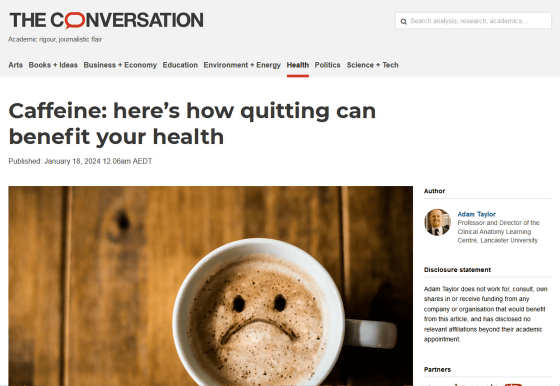What are the benefits of cutting out caffeine?

Caffeine: here's how quitting can benefit your health
https://theconversation.com/caffeine-heres-how-quitting-can-benefit-your-health-220746

◆Decreases negative effects on brain function and mind
When you quit caffeine, you may experience a temporary increase in fatigue and headaches, but this is because your body has developed a tolerance to caffeine. Caffeine binds to receptors for a substance called adenosine in the body, and has the effect of delaying the feeling of fatigue that normally occurs when adenosine binds to receptors. However, your body responds by producing more adenosine receptors, so if you stop consuming caffeine, you may end up with an excess of adenosine receptors, making you feel more tired than before. .
In addition, caffeine's cerebral vasoconstrictive effect reduces blood flow to the brain, which has the effect of temporarily alleviating pain. However, once you stop consuming caffeine , your blood vessels return to normal within 24 hours, increasing blood flow to the brain and causing headaches, which can last up to nine days , says Taylor. He points out. Furthermore, adenosine receptors are also involved in pain regulation, so if you give up caffeine and your adenosine receptors increase, your pain perception may temporarily increase.
When most people hear the word caffeine, they think of the effect of ``waking up''. It is true that caffeine can temporarily reduce sleepiness by slowing down the secretion of melatonin , which regulates sleep, but this also shortens overall sleep time and deep sleep, resulting in feelings of fatigue the next day. According to Taylor, this will increase. As a result of delaying sleepiness with caffeine, you may feel more tired the next day, leading to a cycle where you use caffeine again to relieve your sleepiness, which may lead to sleep disorders. That's why cutting out caffeine can improve your sleep, with some studies showing improvements can be seen in as little as 12 hours.
Additionally, caffeine has been linked to an increase in anxiety and panic disorders , and reducing or completely cutting out caffeine may improve mood. This may be due to improved sleep deprivation, but also because the adenosine receptors that caffeine binds to may also be involved in regulating other neurotransmitters related to stress , happiness , and fear . Taylor said.

◆Heartburn and changes in the cardiovascular system
Too much caffeine can cause heartburn and indigestion because caffeine
Taylor also says that after years of caffeine consumption, the nervous system and heart adapt to the stimulant effects of caffeine, so cutting out caffeine may lower blood pressure and heart rate .
◆Improves teeth whiteness and taste
Caffeinated coffee and tea contain compounds such as tannins that can cause teeth to yellow, so consciously trying to avoid caffeine can cause your teeth to become whiter. It also reduces the intake of sugar contained in energy drinks and other foods, which may improve dental health, and it has also been suggested that caffeinated drinks may reduce the amount of saliva that protects the teeth.
◆Reduces the number of times you go to the toilet
Caffeine also acts as a mild diuretic by stimulating the bladder, causing the urge to urinate, and by binding to adenosine receptors in the kidneys, which affects water retention. It has also been pointed out that caffeine contracts the intestines and causes the urge to defecate, so cutting back on caffeine intake may reduce the number of times you go to the toilet.

As with many foods and nutrients in this world, it's important to limit your caffeine intake in moderation. However, if you suddenly cut out caffeine completely, side effects such as headaches and fatigue may last for 2 to 3 weeks, so it is recommended that you gradually reduce your daily intake. ``How severe and long-lasting the side effects of caffeine withdrawal are depends on how much caffeine you ingest each day and how long the habit lasts,'' Taylor said.
Related Posts:







